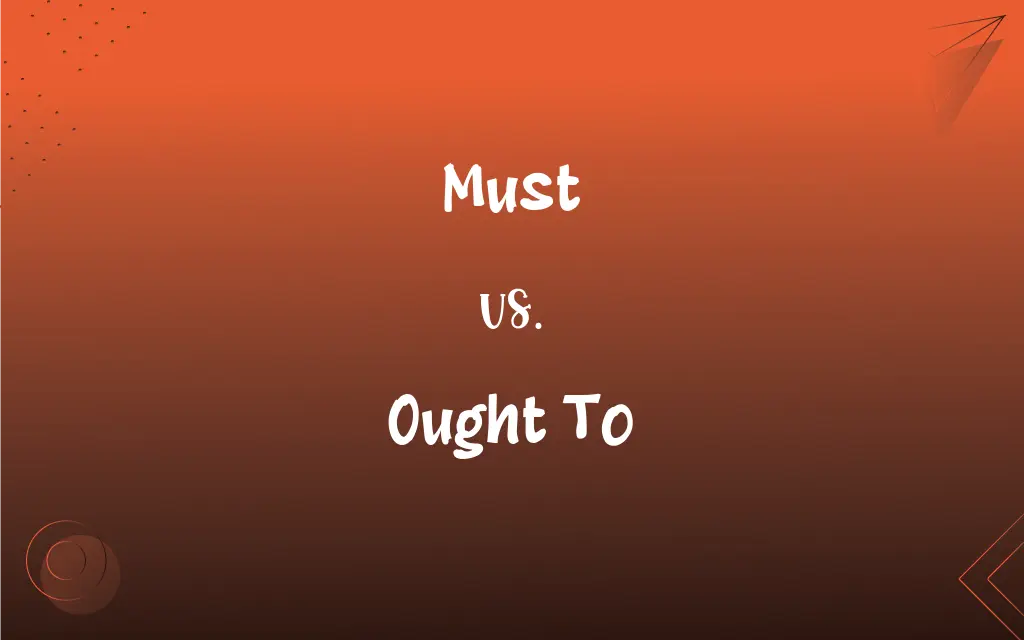Must vs. Ought To: What's the Difference?
Edited by Harlon Moss || By Janet White || Published on December 6, 2023
"Must" implies a necessity or obligation, often more forceful and immediate, while "ought to" suggests a recommendation or moral duty, generally softer and less imperative.

Key Differences
"Must" is a modal verb used to express necessity or obligation, denoting a strong sense of urgency or requirement. However, "ought to" is also a modal verb but conveys advice or recommendation, reflecting a moral or logical duty rather than a mandate.
In speech and writing, "must" is often used for rules, laws, or situations requiring immediate action. While, "ought to" is typically used for suggesting or advising, particularly when considering the rightness or propriety of an action.
"Must" carries a more authoritative and commanding tone, suggesting that there are few or no alternatives. Whereas, "ought to" has a gentler tone, implying a best course of action rather than a strict requirement.
"Must" is commonly used in formal contexts, like legal or safety requirements, where compliance is mandatory. "Ought to" is more prevalent in informal or conversational contexts where suggestions and moral advice are given.
"Must" leaves little room for alternatives, indicating a singular course of action. In contrast, "ought to" allows for more flexibility and acknowledges the presence of other viable options, albeit less preferred.
ADVERTISEMENT
Comparison Chart
Expression of
Necessity or obligation
Advice or recommendation
Usage Context
More formal, strict requirements
Less formal, moral advice
Tone
Authoritative, commanding
Gentle, suggesting
Connotation
Imperative, urgent
Advisable, preferable
Flexibility
Limited alternatives
Acknowledges other options
ADVERTISEMENT
Must and Ought To Definitions
Must
Must indicates a requirement or necessity.
You must wear a helmet while riding a bike.
Ought To
Implies a less forceful obligation.
You ought to check your email regularly.
Must
Must can imply a strong recommendation.
You must try the new restaurant downtown.
Ought To
Used to express expected behavior.
You ought to respect your elders.
Must
Used to express a logical conclusion.
If the lights are on, someone must be home.
Ought To
Indicates a desirable or appropriate action.
You ought to save money for the future.
Must
It expresses obligation or duty.
Students must complete their assignments on time.
Ought To
Ought to indicates a moral obligation.
You ought to apologize for your mistake.
Must
Must is used to add emphasis to a statement.
You must understand the importance of this decision.
Ought To
It suggests advice or recommendation.
You ought to see a doctor if you feel sick.
Must
To be obliged or required by morality, law, or custom
Citizens must register in order to vote.
Must
To be compelled, as by a physical necessity or requirement
Plants must have oxygen in order to live.
FAQs
What does "ought to" suggest?
"Ought to" suggests a recommendation or moral advice.
Is "ought to" appropriate for formal requirements?
"Ought to" is less common in formal requirements; it's more for advice.
Can "must" be used for strong advice?
Yes, "must" can be used to give strong, emphatic advice.
What does "must" imply?
"Must" implies a strong necessity or obligation.
Is "must" used in legal contexts?
"Must" is often used in legal or regulatory contexts.
Can "must" express certainty?
Yes, "must" can express certainty or logical conclusions.
Does "must" allow for flexibility?
"Must" usually implies little to no flexibility.
Is "must" mandatory?
"Must" usually indicates a mandatory action or condition.
How does context affect the use of "must"?
In formal or urgent contexts, "must" is preferred for its imperative tone.
When is "ought to" most appropriately used?
"Ought to" is appropriate in conversational or informal advice settings.
How does "ought to" reflect on morality?
"Ought to" often reflects moral or ethical considerations.
Is "ought to" softer than "must"?
Yes, "ought to" is generally softer and less imperative than "must."
How is "ought to" perceived in advice-giving?
"Ought to" is perceived as gentle and suggestive in advice-giving.
Can "ought to" imply expected social behavior?
"Ought to" often implies expected social or moral behavior.
Can "ought to" be used for personal opinions?
Yes, "ought to" is often used to express personal opinions or advice.
Is "ought to" less direct than "must"?
"Ought to" is indeed less direct and less forceful than "must."
Are there exceptions to the use of "must"?
Yes, the use of "must" can vary based on context and tone.
How do "must" and "ought to" differ in certainty?
"Must" conveys more certainty and urgency than "ought to."
Is "ought to" suitable for expressing personal recommendations?
Yes, "ought to" is suitable for personal and less formal recommendations.
Can "must" indicate a strong recommendation?
Yes, "must" can be used for strong recommendations.
About Author
Written by
Janet WhiteJanet White has been an esteemed writer and blogger for Difference Wiki. Holding a Master's degree in Science and Medical Journalism from the prestigious Boston University, she has consistently demonstrated her expertise and passion for her field. When she's not immersed in her work, Janet relishes her time exercising, delving into a good book, and cherishing moments with friends and family.
Edited by
Harlon MossHarlon is a seasoned quality moderator and accomplished content writer for Difference Wiki. An alumnus of the prestigious University of California, he earned his degree in Computer Science. Leveraging his academic background, Harlon brings a meticulous and informed perspective to his work, ensuring content accuracy and excellence.






































































